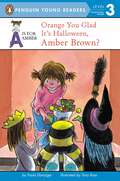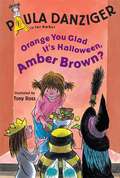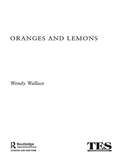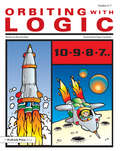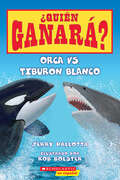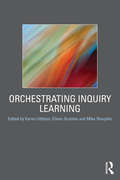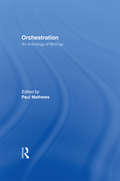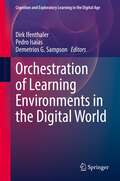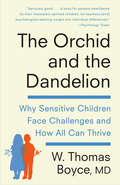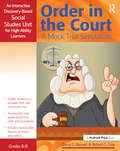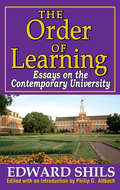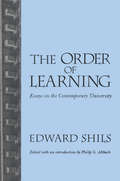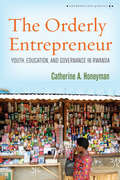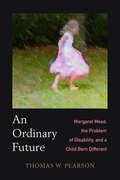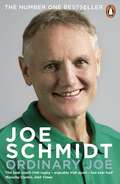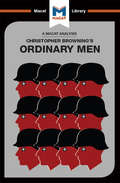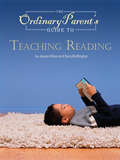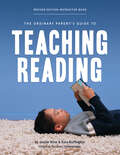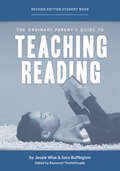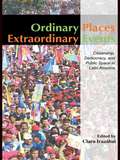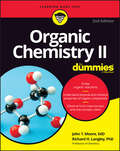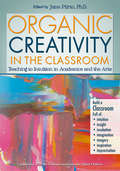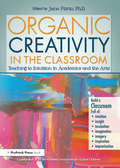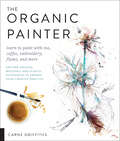- Table View
- List View
Orange You Glad It's Halloween, Amber Brown? (A Is for Amber #6)
by Paula DanzigerHalloween is one of Amber brown's favorite holidays, and this year she has come up with a fantastic costume. It's so perfect that she's keeping it a secret even from her best friend, Justin, no matter what he bribes her with. Amber can't wait to reveal the surprise and go trick-or-treating, but she's worried that her parents' arguing will put a damper on the holiday. But with pumpkin decorating, Halloween jokes, candy treats, and the greatest costume ever, this is going to be the perfect Halloween!
Orange You Glad It's Halloween, Amber Brown? (A is for Amber)
by Paula DanzigerAmber Brown and her classmates celebrate Halloween, while Amber wonders if her parents' arguing will ruin the holiday for her.
Oranges and Lemons: Life in an Inner City Primary School
by Wendy WallaceThis warts-and-all look inside an inner city primary school is an intimate and charming account of how people at Edith Neville primary school approach issues that face urban schools everywhere. The author's insightful journalistic eye focuses on how individuals cope with government initiatives, the needs of the pupils and the community at large. Focusing on the progress of individual children, in some cases from the time they start nursery, this book illuminates contemporary urban school life and provides a human account of major and minor successes, and failures, over a twelve-month period in a passionate but complex educational community. The book highlights how: the school community works to give equal chances to all children staff strive to include children with special needs the school community enlist the support of parents who mistrust the system staff manage distressed and distressing behaviour. In the background the school's managers endeavour to meet targets and inspections, while containing teacher stress and retaining a vision of the broader purpose of education.
Orbiting With Logic: Grades 5-7
by Bonnie L. RisbyThis classic series will excite students' imaginations while enriching skills in logical thinking. Orbiting With Logic problems are easy to incorporate into lesson plans and are formatted to enhance the fullest spectrum of curriculum areas while sharpening thinking skills. Challenging and instructional, these thought-provoking books present sequential exercises in logical reasoning that include relationships, analogies, syllogisms, sequences, deductive reasoning, inference, truth-values, and logical notation. Simple grids coupled with intriguing problems evoke enthusiasm and inspire students to higher and higher levels of thinking. Each book builds on concepts presented previously in the series to offer a comprehensive logic adventure for young thinkers.The skills students build by using this book are applicable to several areas of the curriculum. Academic skills used in reading, math, writing, and science all depend on the ability to perceive and define relationships, sequence events, and form inferences. But, beyond the academic world, students will find logical thinking an integral part of everyday life.This is the last in a three-book series designed to sharpen children's thinking skills. Students will be ready for this book once they have mastered Logic Countdown and Logic Liftoff.Grades 5-7
Orca vs. Tiburón blanco (¿Quién ganará?)
by Jerry PallottaWhat would happen if a great white shark and a killer whale met each other? What if they had a fight? Who do you think would win?Este lector de no-ficción compara y contrasta dos feroces criaturas submarinas. Los pequeños aprenderán sobre la anatomía, el comportamiento y más de la orca y el tiburón blanco. Este libro está lleno de fotos, gráficos, ilustraciones y datos increíbles.This nonfiction reader compares and contrasts two ferocious underwater creatures. Kids learn about the killer whale and the great white shark's anatomies, behaviors, and more. This book is packed with photos, charts, illustrations, and amazing facts.
The Orchestral Revolution
by Emily I. DolanThe Orchestral Revolution explores the changing listening culture of the eighteenth and early nineteenth centuries. Delving into Enlightenment philosophy, the nature of instruments, compositional practices and reception history, this book describes the birth of a new form of attention to sonority and uncovers the intimate relationship between the development of modern musical aesthetics and the emergence of orchestration. By focusing upon Joseph Haydn's innovative strategies of orchestration and tracing their reception and influence, Emily Dolan shows that the consolidation of the modern orchestra radically altered how people listened to and thought about the expressive capacity of instruments. The orchestra transformed from a mere gathering of instruments into an ideal community full of diverse, nuanced and expressive characters. In addressing this key moment in the history of music, Dolan demonstrates the importance of the materiality of sound in the formation of the modern musical artwork.
Orchestrating Inquiry Learning
by Mike Sharples Karen Littleton Eileen ScanlonThere is currently a rapidly growing interest in inquiry learning and an emerging consensus among researchers that, particularly when supported by technology, it can be a significant vehicle for developing higher order thinking skills. Inquiry learning methods also offer learners meaningful and productive approaches to the development of their knowledge of the world, yet such methods can present significant challenges for teachers and students. Orchestrating Inquiry Learning addresses the key challenge of how to resource and support processes of inquiry learning within and beyond the classroom. It argues that technological support, when coupled with appropriate design of activities and management of the learning environment, can enable inquiry learning experiences that are engaging, authentic and personally relevant. This edited collection of carefully integrated chapters brings together, for the first time; work on inquiry learning and orchestration of learning. Drawing upon a broad range of theoretical perspectives, this book examines: Orchestration of inquiry learning and instruction Trajectories of inquiry learning Designing for inquiry learning Scripting personal inquiry Collaborative and collective inquiry learning Assessment of inquiry learning Inquiry learning in formal and semi-formal educational contexts Orchestrating Inquiry Learning is essential reading for all those concerned with understanding and promoting effective inquiry learning. The book is aimed at an international audience of researchers, post-graduate students, and advanced undergraduates in education, educational technology and psychology. It will also be of interest to educational practitioners and policy makers, including teachers, educational advisors, teacher-students and their trainers.
Orchestration: An Anthology of Writings
by Paul MathewsOrchestration: An Anthology of Writings is designed to be a primary or ancillary text for college-level music majors. Although there are several 'how to' textbooks aimed at this market, there is little available that traces the history of orchestration through the writings of composers themselves. By collecting writings from the ninenteenth century to today, Mathews illuminates how orchestration has grown and developed, as well as presenting a wide variety of theories that have been embraced by the leading practitioners in the field. The collection then traces the history of orchestration, beginning with Beethoven's Orchestra (with writings by Berlioz, Wagner, Gounod, Mahler, and others), the 19th century (Mahler, Gevaert, Strauss) the fin de siecle (on the edge of musical modernism; writings by Berlioz, Jadassohn, Delius, and Rimsky Korsakov), early modern (Busoni, Schoenberg, Stravinsky, Grainger, and others), and high modern (Carter, Feldman, Reich, Brant). Many of these pieces have never been translated into English before; some only appeared in small journals or the popular press and have never appeared in a book; and none have ever been collected in one place. The study of orchestration is a key part of all students of music theory and composition. Orchestration provides a much needed resource for these students, filling a gap in the literature.
Orchestration of Learning Environments in the Digital World (Cognition and Exploratory Learning in the Digital Age)
by Dirk Ifenthaler Demetrios G. Sampson Pedro IsaíasThis volume focuses on the implications of digital technologies for educators and educational decision makers that are not widely represented in the literature. The chapters contained in the volume are based on the presentations at the 2020 edition of the CELDA conference and cover multiple developments in the field such as deploying learning technologies, proposing pedagogical approaches and practices to address digital transformation, and presenting case studies of specific technologies and contexts. The chapters form a lively debate and provide a comprehensive analysis of the contribution of learning technologies designed to improve the learning process and the experience of the students as well as to develop key competences.
The Orchid and the Dandelion: Why Some Children Struggle and How All Can Thrive
by W. Thomas BoyceFrom one of the world's foremost researchers and pioneers of pediatric health--a book that offers hope and a pathway to success for parents, teachers, psychologists, psychiatrists, and child development experts coping with "difficult" children, fully exploring the author's revolutionary discovery about childhood development, parenting, and the key to helping all children find happiness and success."Based on groundbreaking research that has the power to change the lives of countless children--and the adults who love them."--Susan Cain, author of Quiet: The Power of Introverts. In Tom Boyce's extraordinary new book, he explores the "dandelion" child (hardy, resilient, healthy), able to survive and flourish under most circumstances, and the "orchid" child (sensitive, susceptible, fragile), who, given the right support, can thrive as much as, if not more than, other children. Boyce writes of his pathfinding research as a developmental pediatrician working with troubled children in child-development research for almost four decades, and explores his major discovery that reveals how genetic make-up and environment shape behavior. He writes that certain variant genes can increase a person's susceptibility to depression, anxiety, attention deficit hyperactivity disorder, and antisocial, sociopathic, or violent behaviors. But rather than seeing this "risk" gene as a liability, Boyce, through his daring research, has recast the way we think of human frailty, and has shown that while these "bad" genes can create problems, they can also, in the right setting and the right environment, result in producing children who not only do better than before but far exceed their peers. Orchid children, Boyce makes clear, are not failed dandelions; they are a different category of child, with special sensitivities and strengths, and need to be nurtured and taught in special ways. And in The Orchid and the Dandelion, Boyce shows us how to understand these children for their unique sensibilities, their considerable challenges, their remarkable gifts.
Order in the Court: A Mock Trial Simulation, An Interactive Discovery-Based Social Studies Unit for High-Ability Learners (Grades 6-8)
by Richard Cote Darcy BlauveltThis book is part of the Interactive Discovery-Based Units for High-Ability Learners series, for grades 6-8, which provides teachers with opportunities to use exciting and challenging units in their classrooms. Order in the Court: A Mock Trial Simulation gives students the opportunity to conduct a trial based on a classic fairytale in order to develop their courtroom skills. After developing the necessary vocabulary, students participate in the trial of Ms. Petunia Pig v. Mr. B. B. Wolf. Students not only learn the concepts, but they also learn valuable teamwork and time management skills. The unit culminates in a full mock-trial enactment.Grades 6-8
The Order of Learning: Essays on the Contemporary University (Higher Education Ser.)
by Edward ShilsThe Order of Learning considers the problems facing higher education by focusing on main underlying factors: the relationship of higher education to government, academic freedom, and the responsibilities of the academic profession, among others. Edward Shils argues that higher education has a central role in society, and that distractions, such as pressures from government, disinterest of students and faculty in education, and involvement of institutions of higher learning in social questions, have damaged higher education by deflecting it from its commitment to teaching, learning, and research.Shils believes that the modern university must be steadfast in its commitment to the pursuit of truth, the education of students, and the provision of research. Universities should not be all things to all people. On one hand, the academic community must understand the essential mission of the university and resist distractions. On the other, government must provide the necessary support to higher education, even when the immediate "pay-off" is not self-evident.This book provides a refreshing new perspective precisely by taking a traditional stance on the role of higher education in modern society. It includes carefully researched and elegantly written essays on many of the central issues facing education today. This work will be of great interest to educators and students alike, as well as those interested in the future of higher education in the United States.
Order of Learning: Essays on the Contemporary University
by Edward ShilsThe Order of Learning considers the problems facing higher education by focusing on main underlying factors: the relationship of higher education to government, academic freedom, and the responsibilities of the academic profession, among others. Edward Shils argues that higher education has a central role in society, and that distractions, such as pressures from government, disinterest of students and faculty in education, and involvement of institutions of higher learning in social questions, have damaged higher education by deflecting it from its commitment to teaching, learning, and research.Shils believes that the modern university must be steadfast in its commitment to the pursuit of truth, the education of students, and the provision of research. Universities should not be all things to all people. On one hand, the academic community must understand the essential mission of the university and resist distractions. On the other, government must provide the necessary support to higher education, even when the immediate "pay-off" is not self-evident.This book provides a refreshing new perspective precisely by taking a traditional stance on the role of higher education in modern society. It includes carefully researched and elegantly written essays on many of the central issues facing education today. This work will be of great interest to educators and students alike, as well as those interested in the future of higher education in the United States.
The Orderly Entrepreneur: Youth, Education, and Governance in Rwanda
by Catherine HoneymanThe first generation of children born after Rwanda's 1994 genocide is just now reaching maturity, setting aside their school uniforms to take up adult roles in Rwandan society and the economy. At the same time, Rwanda's post-war government has begun to shrug off international aid as it pursues an increasingly independent path of business-friendly yet strongly state-regulated social and economic development. The Orderly Entrepreneur tells the story of a new Rwanda now at the vanguard among developing countries, emulating the policies of Singapore, Korea, and China, and devoutly committed to entrepreneurship as a beacon for 21st century economic growth. Drawing on ethnographic research with nearly 500 participants, The Orderly Entrepreneur investigates the impact and reception of the Rwandan government's multiyear entrepreneurship curriculum, first implemented in 2007 as required learning in all secondary schools. As Honeyman shows, "entrepreneurship" is more than a benign buzzword or hopeful panacea for economic development, but a complex ideal with unique meanings across Rwandan society. She reveals how curriculum developers, teachers, and students all brought their own interpretations and influence to the new entrepreneurship curriculum, exposing how even a carefully engineered project of social transformation can be full of indeterminacies and surprising twists every step of the way.
An Ordinary Future: Margaret Mead, the Problem of Disability, and a Child Born Different
by Thomas W PearsonThis vivid portrait of contemporary parenting blends memoir and cultural analysis to explore evolving ideas of disability and human difference. An Ordinary Future is a deeply moving work that weaves an account of Margaret Mead's path to disability rights activism with one anthropologist's experience as the parent of a child with Down syndrome. With this book, Thomas W. Pearson confronts the dominant ideas, disturbing contradictions, and dramatic transformations that have shaped our perspectives on disability over the last century. Pearson examines his family's story through the lens of Mead's evolving relationship to disability—a topic once so stigmatized that she advised Erik Erikson to institutionalize his son, born with Down syndrome in 1944. Over the course of her career, Mead would become an advocate for disability rights and call on anthropology to embrace a wider understanding of humanity that values diverse bodies and minds. Powerful and personal, An Ordinary Future reveals why this call is still relevant in the ongoing fight for disability justice and inclusion, while shedding light on the history of Down syndrome and how we raise children born different.
Ordinary Joe
by Joe Schmidt'He's a great coach. He lives and breathes the game. There's nothing he doesn't know' Brian O'Driscoll'The best coach Irish rugby - arguably Irish sport - has ever had' Malachy Clerkin, Irish TimesIn the autumn of 2010, a little-known New Zealander called Joe Schmidt took over as head coach at Leinster. He had never been in charge of a professional team. After Leinster lost three of their first four games, a prominent Irish rugby pundit speculated that Schmidt had 'lost the dressing room'.Nine years on, Joe Schmidt has stepped down as Ireland coach having achieved success on a scale never before seen in Irish rugby. Two Heineken Cups in three seasons with Leinster. Three Six Nations championships in six seasons with Ireland, including the Grand Slam in 2018. And a host of firsts: the first Irish victory in South Africa; the first Irish defeat of the All Blacks, and then a second; and Ireland's first number 1 world ranking.Along the way, Schmidt became a byword for precision and focus in coaching, remarkable attention to detail and the highest of standards. But who is Joe Schmidt? In Ordinary Joe, Schmidt tells the story of his life and influences: the experiences and management ideas that made him the coach, and the man, that he is today. And his diaries of the 2018 Grand Slam and the 2019 Rugby World Cup provide a brilliantly intimate insight into the stresses and joys of coaching a national team in victory and defeat.From the small towns in New Zealand's North Island where he played barefoot rugby and jostled around the dinner table with seven siblings, to the training grounds and video rooms where he consistently kept his teams a step ahead of the opposition, Ordinary Joe reveals an ordinary man who has helped his teams to achieve extraordinary things.'Rugby obsessives and amateur coaches will revel in the insight that Schmidt offers into his training methods, tactics and preparation ... Full of insight, emotion and considered analysis' Irish Daily Mail'An insight into the fascinating personality of the man who has been the single most influential figure in Irish rugby over the last decade' Irish Times'He is clearly more than an ordinary coach, the winning of two Heinekens, beating New Zealand twice, the 2018 Grand Slam and reaching no.1 in the World Rankings are positive brushstrokes, marking Irish rugby for ever ... A rocky read about exceptional deeds, told in extraordinary fashion' Irish Daily Star'Undoubtedly the greatest coach in Irish rugby history' Daily Telegraph
Ordinary Men: Reserve Police Battalion 101 and the Final Solution in Poland
by James Chappel Tom StammersOf all the controversies facing historians today, few are more divisive or more important than the question of how the Holocaust was possible. What led thousands of Germans – many of them middle-aged reservists with, apparently, little Nazi zeal – to willingly commit acts of genocide? Was it ideology? Was there something rotten in the German soul? Or was it – as Christopher Browning argues in this highly influential book – more a matter of conformity, a response to intolerable social and psychological pressure? Ordinary Men is a microhistory, the detailed study of a single unit in the Nazi killing machine. Browning evaluates a wide range of evidence to seek to explain the actions of the "ordinary men" who made up reserve Police Battalion 101, taking advantage of the wide range of resources prepared in the early 1960s for a proposed war crimes trial. He concludes that his subjects were not "evil;" rather, their actions are best explained by a desire to be part of a team, not to shirk responsibility that would otherwise fall on the shoulders of comrades, and a willingness to obey authority. Browning's ability to explore the strengths and weaknesses of arguments – both the survivors' and other historians' – is what sets his work apart from other studies that have attempted to get to the root of the motivations for the Holocaust, and it is also what marks Ordinary Men as one of the most important works of its generation.
The Ordinary Parent's Guide to Teaching Reading
by Sara Buffington Jessie WiseA plain-English guide to teaching phonics. Every parent can teach reading--no experts need apply! Too many parents watch their children struggle with early reading skills--and don't know how to help. Phonics programs are too often complicated, overpriced, gimmicky, and filled with obscure educationalese. The Ordinary Parent's Guide to Teaching Reading cuts through the confusion, giving parents a simple, direct, scripted guide to teaching reading--from short vowels through supercalifragilisticexpialidocious. This one book supplies parents with all the tools they need. Over the years of her teaching career, Jessie Wise has seen good reading instruction fall prey to trendy philosophies and political infighting. Now she has teamed with dynamic coauthor Sara Buffington to supply parents with a clear, direct phonics program--a program that gives them the know-how and confidence to take matters into their own hands.
The Ordinary Parent's Guide to Teaching Reading, Revised Edition Instructor Book (Second Edition, Revised, Revised Edition)
by Jessie Wise Sara BuffingtonAn updated, easier-to-use edition of the program that helped a million parents teach their children to read. Parents can teach their children to read--no expertise required! Parents can take charge of their children’s literacy with this updated, easier-to-use edition of the classic jargon-free phonics guide. Too many parents watch their children struggle with early reading skills — and don’t know how to help. Many phonics programs are too often complicated, overpriced, gimmicky, and filled with obscure educationalese. The Ordinary Parent’s Guide to Teaching Reading, Revised Edition cuts through the confusion, giving parents a simple, direct, scripted guide to teaching phonics and reading— from short vowels through supercalifragilisticexpialidocious. A new layout makes understanding and teaching the concepts even easier. With the accompanying Student Book, parents will have everything they need to take their children from the basics all the way to a fourth-grade reading level. Features a new introduction by Dr. Susan Wise Bauer.
The Ordinary Parent's Guide to Teaching Reading, Revised Edition Student Book (Second Edition, Revised, Revised Edition)
by Jessie Wise Sara BuffingtonLearn to read letters, sounds, words, sentences, and full stories! New to the Revised Edition, this Student Book contains all the text your child will need for the lessons in The Ordinary Parent’s Guide to Teaching Reading, Revised Edition. Created and designed based on feedback from parents and teachers over the past 20 years, the Student Book allows children to focus only on the material they are using, without being distracted by additional text in the Instructor Book. From “a” to “supercalifragilisticexpialidocious,” these pages are the doorway to a whole lifetime of reading.
Ordinary Places/Extraordinary Events: Citizenship, Democracy and Public Space in Latin America (Planning, History and Environment Series)
by Clara IrazábalClara Irazábal and her contributors explore the urban history of some of Latin America’s great cities through studies of their public spaces and what has taken place there. The avenues and plazas of Mexico City, Havana, Santo Domingo, Caracas, Bogotaì, SaÞo Paulo, Lima, Santiago, and Buenos Aires have been the backdrop for extraordinary, history-making events. While some argue that public spaces are a prerequisite for the expression, representation and reinforcement of democracy, they can equally be used in the pursuit of totalitarianism. Indeed, public spaces, in both the past and present, have been the site for the contestation by ordinary people of various stances on democracy and citizenship. By exploring the use and meaning of public spaces in Latin American cities, this book sheds light on contemporary definitions of citizenship and democracy in the Americas.
Organic Chemistry II For Dummies
by John T. Moore Richard H. LangleyWith Dummies at your side, you can conquer O-chem Organic chemistry is, well, tough. With Organic Chemistry II For Dummies, you can (and will!) succeed at one of the most difficult college courses you’ll encounter. We make the subject less daunting in the second semester, with a helpful review of what you learned in Organic Chemistry I, clear descriptions of organic reactions, hints for working with synthesis and roadmaps, and beyond. You’ll love the straightforward, effective way we explain advanced O-chem material. This updated edition is packed with new practice problems, fresh examples, and updated exercises to help you learn quickly. Observe from a macroscopic and microscopic view, understand the properties of organic compounds, get an overview of carbonyl group basics, and everything else you’ll need to pass the class. Organic Chemistry II For Dummies is packed with tips to help you boost your exam scores, stay on track with assignments, and navigate advanced topics with confidence. Brush up on concepts from Organic Chemistry I Understand the properties of organic compounds Access exercises and practice questions to hone your knowledge Improve your grade in the second semester of Organic ChemistryOrganic Chemistry II For Dummies is for students who want a reference that explains concepts and terms more simply. It’s also a perfect refresher O-chem veterans preparing for the MCAT.
Organic Creativity in the Classroom: Teaching to Intuition in Academics and the Arts
by Jane PiirtoOrganic Creativity in the Classroom demonstrates an approach to teaching creatively-teaching to intuition-that is written by experienced, award-winning classroom teachers. Instead of focusing on divergent production skills such as fluency and flexibility, an outdated approach that dominates the field of creativity studies, this book includes helpful strategies that can be used to encourage students to become more creative within a specific domain. Teachers of writing, mathematics, science, social science, literature, foreign language, theater, songwriting, psychology, comparative religion, and arts education, among other domains, who infuse creativity and intuition into their classrooms share their practical advice using an insightful storytelling approach.
Organic Creativity in the Classroom: Teaching to Intuition in Academics and the Arts
by Jane PiirtoCreativity can be taught and nurtured, and we can build classrooms in which creativity thrives. This philosophy acts as a central thesis in a new book, Organic Creativity in the Classroom, edited by award-winning author Jane Piirto, Ph.D.This innovative collection of essays explores approaches to teaching creativity from the perspective of experienced educators and artists. The 23 authors have taught for more than 500 years combined, and in this book they share teaching stories and helpful strategies that can be used to encourage students to become more creative within specific domains. The authors include master teachers, curriculum theorists, holistic educators, and award-winning practitioners of writing, mathematics, science, social science, literature, foreign language, theater, songwriting, dance, music, and arts education, among other domains, who incorporate creativity and intuition into their classrooms. In this readable and lively book, they share their personal stories and practical advice for infusing creativity into the lives of students.
The Organic Painter: Learn to Paint with Tea, Coffee, Embroidery, Flame, and More
by Carne GriffithsFind new creative possibilities with unconventional media—using innovative techniques to turn everyday materials into non-traditional, natural “paints.”Traditional art supplies will only take you so far! Sometimes you need to try something completely new and different. With the guidance in The Organic Painter, you’ll soon be painting with everyday materials you’d never considered as an artistic medium.This inspiring book gives you all the techniques and ideas you’ll need to boost your creativity, learn natural paint-making, and be more resourceful with your art materials. Imagine the unique things you’ll make when you create natural paints from coffee, tea, embroidery thread, flame, and more.Each project in this guidebook comes with instructions on how to make the paint, and also includes experiments and explorations for you to try. Plus, a simple painting accompanies every featured material and combines it with other materials or techniques—so you’ll never lack inspiration.
